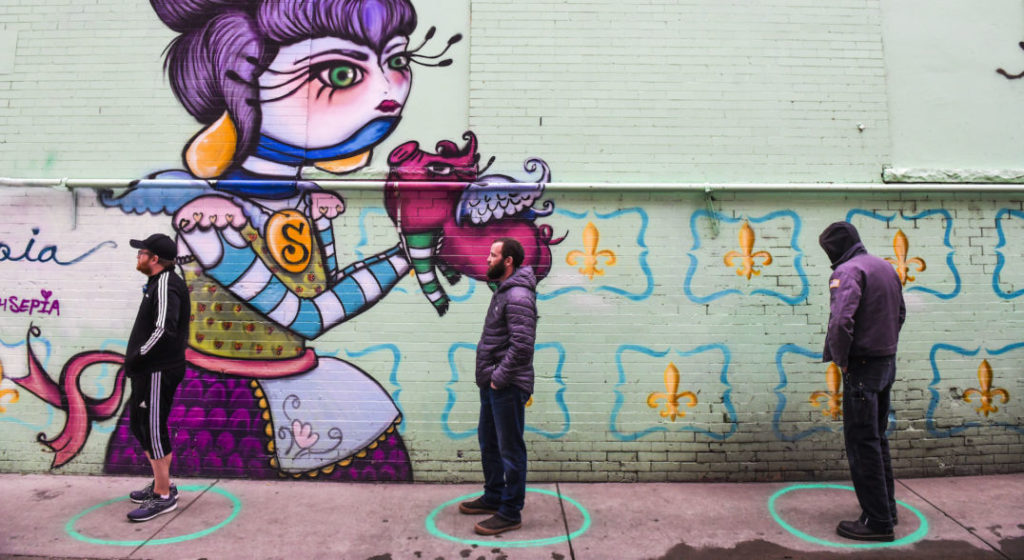“Covid-19, and Our Tribal Identities
When Our Moral Psychology Turns on Itself
Hector A Garcia Psy.D.
Hector Garcia, Ph.D., is a professor of psychiatry at the University of Texas Health Science Center at San Antonio. [Alpha God: The Psychology of Religious Violence and Oppression; Sex, Power, and Partisanship: How Evolutionary Science Makes Sense of Our Political Divide]
Posted Apr 27, 2020
https://www.psychologytoday.com/gb/blog/alpha-god/202004/covid-19-and-our-tribal-identities
(…)
As examples, golf courses around the nation were allowed to remain open, along with beaches in Florida. Texas Republican Governor Greg Abbot decreed that religious services are allowable, despite the obvious risks (churches were already defying previous restrictions). With emboldening tweets from Donald Trump, anti-lockdown rallies have proliferated, touting the pandemic as a liberal media conspiracy, and containment efforts as anti-freedom—one protestor’s sign read “Social Distancing is Communism!,” another, “Liberate America!”. Notably, these are gatherings of potentially infectious people in close contact with one another, and perhaps unsurprisingly the virus has begun to kill protestors. While the common thread of churches, Trump, Texas governance, and even golf courses may be political conservatism, how do we make sense of this dangerously irrational behavior?
It is ironic that our sensible, science-based efforts to remove ourselves from corona’s onslaught push against ancient instincts designed to help us survive infectious disease. In other words, our pathogen-survival instincts may have outlived their utility, and today may be helping to actually spread COVID-19 rather than contain it. It may be surprising to learn that these very instincts drive our political behaviors. Given that our strategic responses to infectious disease are utterly dependent on political processes, understanding our evolved responses to germs is now literally a matter of life and death. To ensure our future, we may start with a look to our past.
Our hunter-gatherer ancestors knew nothing about what diseases really were. The microbiologic world was invisible to them. They had no vaccines. They had no antibiotics. But they were (as we are now) equipped with what is known in the evolutionary sciences as a behavioral immune system—a set of emotional responses such as disgust, fear, and hostility that helped them withdraw from potential pathogens. Given that humans were the biggest vectors of disease, that immune system included a prejudicial psychology against outsiders; strangers potentially carried pathogens for which the tribe had no immunity. We already know the devastating impact that contact between distal peoples has had on human populations—that is, before the advent of vaccines, and an understanding of physical distancing. As one crushing example, diseases brought by the European invasion of the “New World” sent up to 90% of Native Americans to their graves.
Fear of germs, like so many other traits, falls on the natural curve. Just as there were advantages to xenophobia in our ancestral environments, there were advantages to xenophilia (an attraction to outsiders), which afforded our ancestors greater access to new technologies, and mates outside their gene pool. One of the most robust findings in the science of our political psychology is that those who are more germ-and-xenophobic tend to be more politically conservative. It makes sense, then, that today those with greater xenophobia would be drawn to politics that are hawkish in their foreign policy, take tough stances on border security, and posture against affirmative action (which helps people who may be seen as outsiders).
Interestingly, those on the conservative end (on average) tend to be not only more fearful of germs and outsiders, but to be generally more fearful. Imaging studies even find conservatives tend to have larger amygdalae, a brain structure that generates our fear responses.2 Yet, those protesting on the streets, violating isolation orders, putting not only others but also themselves in mortal danger, tend to be overwhelmingly far right. The explanation to this stunning contradiction—tribalism.
(…)
Sometimes the signals are visual. Think of aboriginal tribes that wear similar regalia to signify belonging—similar headdresses, similar colors, or even tribal scarring or tattoos. Today’s maga-hats, protest signs, political bumper stickers, and T-shirts, tell other members of the group that you’re with them. At other times the signal is showing agreement, and an alarming degree of this kind of conformity happens below the level of conscious awareness. There is important research on this tendency worth pondering.
(…)
Indeed, that tendency to mentally suppress information that runs contrary to group consensus appears to be related to the fact that humans are exquisitely talented at detecting liars, cheaters, or even insincerity. And so, the capacity to self-deceive may have developed to conceal our true beliefs. Indeed, if Wrangham is right, this ability to self-deceive may have kept our ancestors from getting murdered by their peers.
(…)
One revealing study examined how highly partisan liberals and conservatives respond to fabricated newspaper stories on welfare programs.5 One program was exorbitantly generous, the other inflexibly stingy. The researchers then queried which program subjects supported. Given what everyone already knows about our political stances, you might guess which side supported which policy. However, before subjects rated their support, they were told that House Democrats (or Republicans) strongly endorsed each of the two welfare policies, and that the rival partly strongly rejected them. If conservatives believed their party supported the lavish welfare policy, they too supported it, and vice-versa for liberals. This shows us that the impulse to go with the tribe can override our own strongly held principles. Tellingly, subjects reported that their own policy perspectives influenced them most, and that the stances of lawmakers least, despite going with the flow in a way that so blatantly contradicted their own values. In other words, they were blind to their own tribalistic blinders. And therein lies the problem.
(…)
When protestors see each other in their tribal regalia, when they chant in unison, they feel an ancient, emotionally intuitive sense of belonging. And that they’ve identified an outside force (represented by the liberal media, science, etc.) it draws their emotional ties to each other even tighter. Moreover, by cohering to the preposterous idea that the need for physical distancing is a liberal conspiracy, they reaffirm each other of their commitment to the tribe. But this puts everyone, including themselves, at grave risk. It’s antisocial. It’s dangerous. It’s asinine. But it is explainable. We are social animals operating in groups inclined to show commitment to one another through agreement. What we agree on can be like a virus itself. And critical thinking gets swallowed up by our ancients fears of rejection.”



